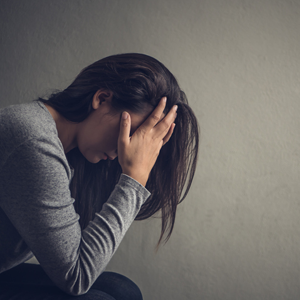
Unfortunately doctors still don’t know what causes irritable bowel syndrome (IBS) – but they believe that a combination of problems can lead to the condition.
They do know, however, that functional gastrointestinal (GI) disorders, such as IBS, are problems with brain-gut interaction (i.e. how your brain and stomach work together), according to the National Institute of Diabetes and Digestive and Kidney Diseases (NIDDK).
The NIDDK says, “Experts think that problems with brain-gut interaction may affect how your body works and cause IBS symptoms. For example, in some people with IBS, food may move too slowly or too quickly through the digestive tract, causing changes in bowel movements. Some people with IBS may feel pain when there's a normal amount of gas or stool in the gut.”
Although common symptoms of IBS affect the stomach and digestive system, there are other symptoms that don’t. Here are four:
1. Headaches
According to Dr Bethany DeVito, a gastroenterologist at North Shore University Hospital in Manhasset, New York, it’s common for IBS patients to report symptoms unrelated to digestion. She says there is an established connection between IBS and migraines in the medical community.
For example, a 2005 study published in the Polish Journal of Neurology and Neurosurgery found that 23 to 53% of people with IBS suffer from frequent headaches, while 10 to 20% experience migraine headaches and IBS.
Another study, published in BMC Gastroenterology, says that people with IBS are 40 to 80% more likely to suffer from migraines, fibromyalgia and/or depression than those who don't have IBS.
A 2012 study published in Current Pain and Headache Reports reports a further connection between migraine headaches, IBS and coeliac disease (hypersensitivity to gluten).
Some patients find that symptoms of IBS and migraines occur simultaneously. “During the migraine attacks, some patients also have associated gastrointestinal disturbances, such as nausea, vomiting, abdominal pain and diarrhoea,” Dr DeVito said. Other patients report that IBS symptoms occur between headache attacks.
Stress is one factor that can cause both symptoms. “This mind-body connection is real and can greatly influence health,” said Dr Maxwell Chait, gastroenterologist at Columbia Doctors Medical Group in Hartsdale, New York. Serotonin is another: "Serotonin is a major neurotransmitter of the gastrointestinal tract that plays a relevant part in IBS as well as migraine.”
2. Frequent urination
Researchers aren't sure why but bowel and bladder problems overlap. Research shows that 50% of people who have IBS suffer from urinary issues, which include an overactive bladder (OAB), incomplete emptying of the bladder, getting up in the night to urinate (nocturia), and urinary urgency. Ally Marie believes that because she has IBS-C, her full bowel often puts pressure on her bladder, causing her to urinate frequently.
“Having IBS-C and not IBS-D, I don’t have to deal with sprinting to the bathroom on a plane ride for #2, but I’m that annoying person that says, ‘Excuse me!’ 10 times on a flight because I constantly have to pee! I also have very interrupted sleep because I have to get up multiple times in the night to pee (nocturia). Also, just like I never feel as if I completely finish a bowel movement, I always feel like I could pee again, right after I finish going #1.”
3. Fatigue
When you suffer from IBS, you can become fatigued when your symptoms are triggered. According to the NIDDKD, common food triggers include fatty foods, artificial sweeteners, alcohol, dairy, caffeine, beans, cabbage and other gas-causing foods.
IBS can also cause fatigue due to intestinal inflammation, which lowers levels of glutamic acid. Eva Cwynar, author of The Fatigue Solution, explains that lower glutamic acid levels mean lower levels of gamma-aminobutyric acid, or GABA, which is an agent that helps to calm the brain.
The result of low GABA levels? Exhaustion, restlessness, stress and fatigue.
4. Anxiety and depression
People who have IBS often suffer from anxiety and depression, which can in turn worsen symptoms, says the Anxiety and Depression Association of America (ADAA). Why? Because the nervous system controls the colon, which responds to stress. According to the National Digestive Diseases Information Clearinghouse an estimated 70% of people with IBS do not receive treatment to manage their symptoms. And of those who do seek help, between 50 and 90% have a psychiatric disorder such as anxiety or depression.
The Anxiety and Depression Association of America (ADAA) says the following can help:
- Antidepressants can minimise anxiety and depression symptoms, which in turn can help with IBS.
- Cognitive behavioural therapy can teach you how to cope with anxiety and depression. The British Society of Gastroenterology recommends psychological therapy as the first-line treatment for IBS if you have a history of anxiety, panic attacks or depression. The American College of Gastroenterology also recommends therapy, which can reduce anxiety and IBS symptoms.
- The ADAA suggests practising relaxation techniques to help reduce and manage stress.
Image credit: iStock




 Publications
Publications
 Partners
Partners















